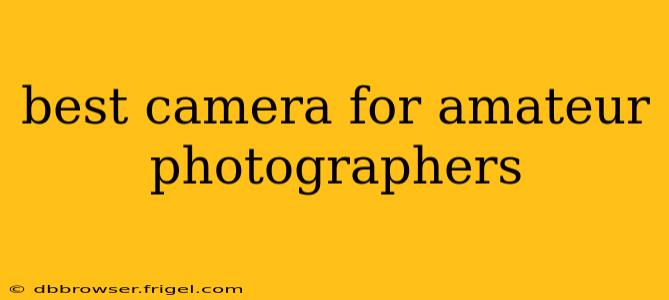Choosing your first camera can feel overwhelming. The market is flooded with options, each promising amazing photos. But the "best" camera is entirely subjective and depends on your individual needs, budget, and photographic aspirations. This guide will help you navigate the choices and find the perfect camera to kickstart your amateur photography journey.
What Type of Photography Interests You?
Before diving into specific camera models, consider what kind of photography excites you. Different cameras excel in different areas:
- Landscape Photography: A camera with excellent low-light performance and a wide dynamic range is crucial for capturing stunning landscapes.
- Portrait Photography: A camera with a good autofocus system and a shallow depth of field capability is ideal for capturing flattering portraits.
- Wildlife Photography: A camera with a fast autofocus system, a telephoto lens, and potentially image stabilization is essential for capturing wildlife in action.
- Street Photography: A compact and lightweight camera that's quick and easy to use is best for capturing candid moments on the streets.
Mirrorless vs. DSLR: Which is Right for You?
Two main camera types dominate the market for amateur photographers:
- Mirrorless Cameras: These cameras are generally smaller, lighter, and offer excellent image quality. They often feature advanced autofocus systems and are increasingly popular due to their versatility and ease of use.
- DSLR Cameras (Digital Single-Lens Reflex): While still a strong contender, DSLRs are generally larger and heavier than mirrorless cameras. They often offer a more extensive lens selection, but this advantage is diminishing as mirrorless systems mature.
What are the Best Cameras for Beginners? (Recommendations)
This section avoids specific model years to maintain relevance. Look for current models with similar specifications. Pricing changes frequently.
Budget-Friendly Options (Under $500):
Many excellent entry-level cameras fall into this price range. Look for cameras with interchangeable lenses (allowing for future upgrades) and good autofocus. Check reviews to ensure the camera is easy to use and offers intuitive controls for beginners.
Mid-Range Options ($500-$1000):
Mid-range cameras offer improved image quality, faster autofocus, and more advanced features. This price bracket opens up more lens options and allows for more creative control. Consider cameras with weather sealing if you plan to shoot outdoors in challenging conditions.
Higher-End Options (Over $1000):
These cameras offer professional-level image quality, performance, and features. While not strictly necessary for beginners, if your budget allows and you're serious about photography, a higher-end camera will provide a significant boost in image quality and functionality.
What Lenses Should I Consider?
The lens is just as important as the camera body. A versatile starting point is often a kit lens (included with many camera bodies), which provides a decent range of focal lengths. However, as your skills and interests develop, consider these lens types:
- Prime Lens: Offers superior image quality and a faster aperture (allowing for better low-light performance and shallow depth of field).
- Telephoto Lens: Great for wildlife, sports, and portraits from a distance.
- Wide-Angle Lens: Ideal for landscapes and architecture.
How Important is Megapixel Count?
While megapixels influence image resolution, it's not the sole indicator of a good camera. A higher megapixel count isn't always better, especially for beginners. Focus on image quality, autofocus, and other features before prioritizing megapixels.
What Accessories Should I Buy?
Investing in a few accessories can significantly improve your photography experience:
- Extra Battery: Avoid running out of power during important shots.
- Memory Card: Choose a fast and reliable memory card with sufficient storage capacity.
- Camera Bag: Protect your camera and lenses from damage.
- Cleaning Kit: Keep your camera lens clean for optimal image quality.
Where Can I Learn More About Photography?
Don't underestimate the power of learning. Many online resources, YouTube channels, and photography courses can help you master the art of photography.
By considering your interests, budget, and the advice provided here, you'll be well-equipped to choose the best camera for your amateur photography journey. Happy shooting!
